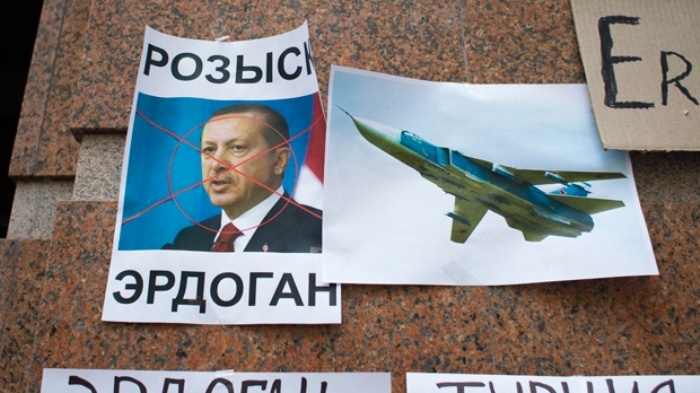Downing the Russian Sukhoi, Turkey Ups the Ante

By: Ali Seyedrazaghi
Radar tracks released by Turkish military claim that Russian fighters violated the Turkish airspace for a short span of 17 seconds, four kilometers deep into the country's territory. Within this time span, Ankara's F16 fighter jets have sent frequent warnings to Russian Sukhoi-24 bombers, forcing one to retreat into Syria, and downing the second which either insisted on hovering over the Turkish territory, or had received no warning due to failure of communication. The crisis emanating from Ankara's measure could have had serious consequences for both Turkey and the Middle East. Although Turkish officials have frequently stated that violation of their airspace by Russian and Syrian jets is intolerable, their decision to shoot the Sukhoi bomber appeared to be a botched decision.
Turkey's current foreign policy is not in line with the political nature of the country. Only certain types of polities can play the game in the Middle East. These are either powerful countries or oil-dependent economies with generally undemocratic systems of government. One needs either enormous financial resources and a powerful military, or an ideological foreign policy that is ready to pay the heavy financial and political price to advance its goal in this minefield. Turkey follows none of these models. Turkey is a democratic state with limited financial and military capacities and does not have the potential to change the game in Syria. In Turkey, the checks and balances mechanisms implemented by the parliament on the one hand, and by institutions such as the media on the other hand, place strong restrictions on the government and its diplomatic apparatus. Two years ago, an aid convey headed towards the Turkaman-dominated region of Syria was stopped in the city of Adana since its mission had not been approved by the parliament.
The nature of Turkey's economy is also at odds with the ruling AK Party's idealistic Middle East policies. Turkey's economy is fully integrated in the global economy and its economic growth is heavily reliant on the rule of a single party and stability both inside the country and in the neighboring countries. By avoiding crises that have occupied its neighbors in the Middle East, Turkey has achieved an average of 5 percent annual growth rate. The Syrian crisis and the political turmoil in Egypt have struck a blow to the Turkish economy, damaging the 'southern highway' for Turkish exports. Three million war refugees have fled to Turkey, and 7 billion dollars have been spent for them so far.
In the meantime, Turkey enjoys extensive, strategic relations with Russia. Following the Syrian crisis, Turkey's economy shifted towards the Russian markets. Russian tourists stand in the second rank of foreign visitors to Turkey with 3.5 million Russian citizens visiting the country each year. Last year, 58% of Turkish gas was provided by Russia. Moreover, Turkey's exports to Russia form a critical portion of the country's economy. In 2014, the trade volume between the two countries exceeded 30 billion dollars. Such facts and figures show that Ankara-Moscow relations cannot be fettered by their different attitude towards the Syrian crisis.
Different narratives have tried to explain Turkey's unprecedented act of downing the Russian bomber. Some analysts view Turkey's move as a serious warning to Moscow by Ankara in its capacity as a NATO member. Lack of both determination and a clear strategy in Syria by Western countries invalidates this reading however.
The second explanation, that this was a reaction to frequent violations of Turkey's airspace by Russian fighters, is not strong enough to justify a decision that could have turned into a serious crisis. Turkish F16s could escort the Sukhoi bombers back into Sria and easily avert a crisis.
The third hypothesis addresses Turkey's plan for the Bayir Bucak region in northwestern Syria. Ankara aims to establish a buffer zone of 40 km width for Turkaman forces and refugees inside the Syrian soil and had to show Russia its seriousness about this plan. But could shooting down the Sukhoi stop Russia's air raids in this area? There have been no signs for that so far. It seems that finding a justifiable reason for Turkey's decision to down the Russian fighter is an unfinished task.
* This piece was originally published in Iranian Diplomacy Persian. Ali Seyedrazaghi is a PhD candidate in London School of Economics.

